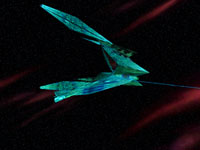
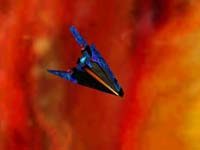
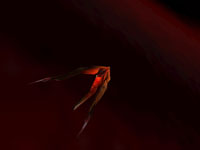
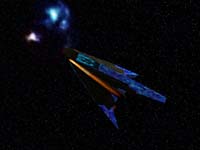
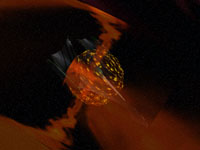
|
Overview -
Tholian tactics hinge upon endurance and perseverance. While Tholian warships mount few heavy disruptors (HDs),
and therefore lack a decisive first strike ability, their strong shields and hulls, and
above average sensors offset this shortcoming. Moreover, large phaser suites and the relative accuracy of the HD allow for unmatched targeting precision--the best
captains are expert at sub-targeting.
Shield Reinforcement Priorities -
- forward, aft.
- the forward shield is the most critical shield facing for Tholians. Beneath it lies their HD and sensor suites--both are easily damaged, and the loss of either is crippling.
- impulse engines (protected by the aft shield) are third most crucial subsystem--Tholian vessels
begin with a significant speed disadvantage, and cannot afford an additional loss of speed.
Damage Control Priorities -
- heavy disruptors, sensors, impulse, warp.
Terrain -
- Solar Corona: highly favourable. The decrease in web efficiency is more than offset by the increased damage
from phaser fire. Corona's also play to Tholian shield, sensor, and hull strengths.
- Black Holes: favourable. Black holes enhance web function. Tholian hull strength also is advantageous.
- Asteroids: favourable. Rapid turn rates allow Tholian ships greater speeds than other vessels in asteroid fields.
- Planetary Ring: unfavourable. Planetary rings negate the advantage conferred by shield superiority, and
interfere with web function. Excellent turn rates, strong hulls and good sensors provide some offset.
- Planetary Atmosphere: unfavourable. Loss of web function a major disadvantage. Shield and hull damage from
movement provide some offset.
- Gas Giants: highly unfavourable. Impairment of phasers and web cannon is a major disadvantage, along with
reinforcement of secondary and heavy weapons (Tholians vessels are deficient in these). Hull and
shield strength provides a slight offset.
Standard Battle Tactics -
A typical mode of attack is to concentrate fire on the target's weakest subsystems or shield facing (often sensors, impulse, or warp; dorsal or ventral shields). This emphasizes the high accuracy and rapid rate of Tholian fire,
while downplaying the lack of heavy weapons crunch power. Only once a target is crippled by the loss of one or
more subsystems will Tholians attempt to destroy its hull.
Maintaining a high rate of fire precludes overloading secondary
weapons to levels at which feedback damage cannot repaired quickly--typically no more than 125% to 150% with additional power diverted to
damage control. Primary weapons may be overloaded for short bursts of fire, but should never be overloaded for sustained use.
The web cannon, a key component of Tholian tactics, should be powered at all times. While a charged tractor is
necessary for the cannon to fire, it is not required during the charging phase. Given the slow charge time of
the web, and its extremely short range (and therefore limited firing opportunity), the tractor should be
charged on an as needed basis--freeing up power for damage control, shield reinforcement,
ECM, etc.
Tholian cruisers, battlecruisers, and dreadnoughts are armed with a heavy disruptors (HDs) in both forward and aft arcs.
Captains should employ both firing arcs to the greatest extent possible. Executing barrel rolls at medium ranges is one method of accomplishing this. Such manoeuvring accomplishes three things: first, it disperses incoming fire over all of the vessels shields,
extracting the greatest advantage from Tholian shield strength, while protecting the critical forward facing; second, when
overloading forward HD's to 150%, it allows for damage control to effect repairs between volleys, significantly extending the
weapon's effective life; third, it allows AI controlled gunners in the aft arc to extract the maximum damage from phaser fire (ai
gunners can strip shield facings very rapidly through phaser fire alone--far faster than manually controlled gunners).
The Tholian web is among the most idiosyncratic weapons in the quadrant. While it disables the engines of any
ship caught within, leaving the ship adrift but with attitude control, it is slow to charge and extremely short
ranged. And while trapped vessels may not return fire, it is by no means a license to pummel. For best effect,
the web should be used not only to enable a decisive strike, but also to cover a safe retreat (particularly when larger ships). Small vessels lacking aft HDs should maintain the target within their forward arc bombarding it HD
and phaser fire while retrograding to a safe range (>7,000k). Vessels with aft HD's should strike first with forward weapons
and then over-run and bombard with aft weapons while opening range. Range is particularly important when fighting an opponent
with short ranged weapons (plasma, QCB, GRHC, GDDS).
|




